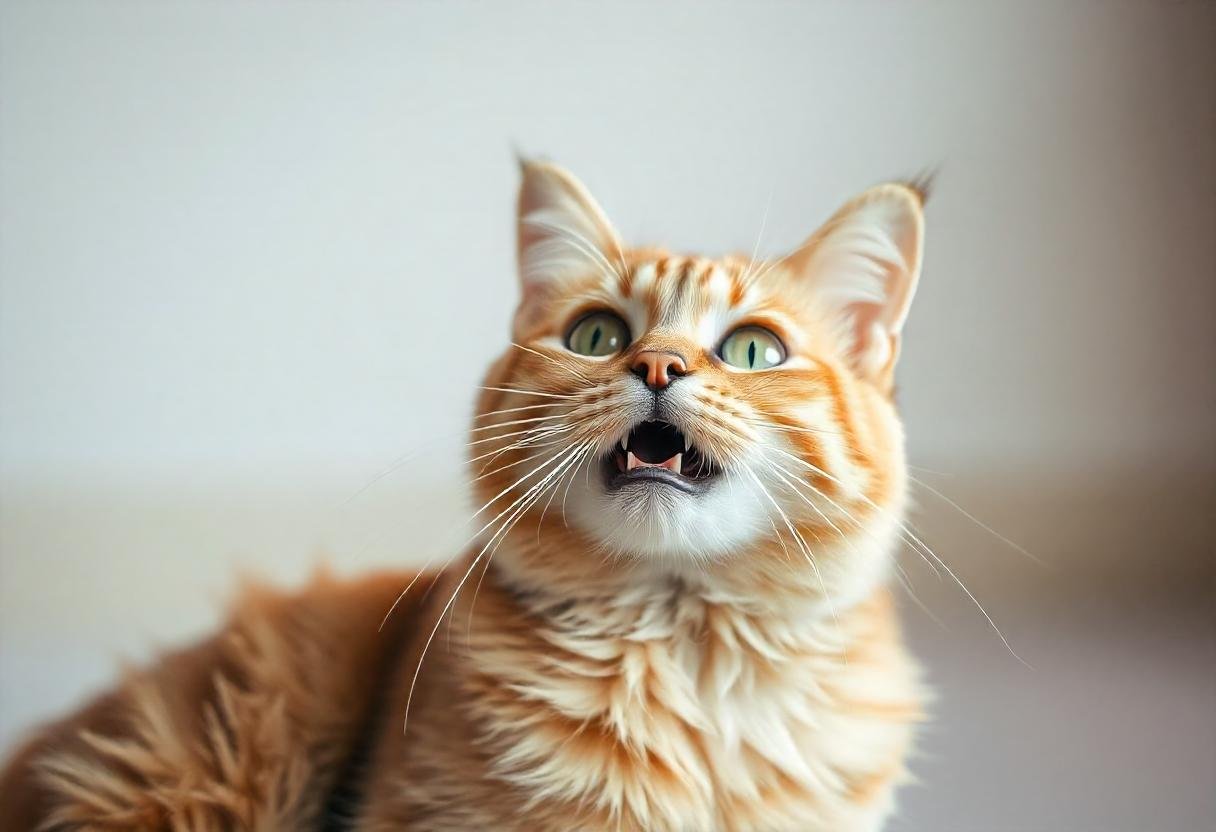Every cat owner knows their furry friend has a unique voice, with meows, purrs, and chirps that can range from gentle to demanding.
But what happens when your cat’s meow suddenly sounds hoarse or raspy? You might find yourself worried, wondering what’s going on and how to help.
Why Does My Cat Have a Hoarse Meow a Concern?
A hoarse meow in cats can be a sign of a variety of conditions, ranging from simple irritation to serious medical problems.
It’s important to pay attention to your cat’s voice and look for any other concerning symptoms.
Understanding a Cat’s Vocal Cords
A cat’s vocal cords, located in the larynx (voice box), are small bands of muscle that vibrate to produce sound.
When these vocal cords become irritated, inflamed, or damaged, they can cause a change in a cat’s meow.
Common Causes of a Hoarse Meow in Cats
Here are some common reasons why a cat might develop a hoarse meow:
- Upper Respiratory Infections (URIs): URIs, commonly caused by viruses or bacteria, can cause inflammation and swelling of the nasal passages, throat, and larynx, leading to a hoarse meow.
- Feline Herpesvirus (FHV): FHV is a common virus that can cause chronic or recurrent upper respiratory infections in cats, including a hoarse meow, sneezing, and eye discharge. It can also lead to ulcers on the nose and mouth.
- Feline Calicivirus (FCV): FCV is another common virus that can cause upper respiratory infections, including a hoarse meow.
- Allergies: Allergies to pollen, dust mites, mold, or other environmental allergens can cause inflammation and swelling of the nasal passages and throat, leading to a hoarse meow.
- Foreign Objects: Small objects, such as grass awns or pieces of food, can become lodged in the throat, causing irritation and a hoarse meow.
- Trauma: Injuries to the throat, such as a bite or a scratch, can cause inflammation and a hoarse meow.
- Vocal Cord Paralysis: In rare cases, a cat’s vocal cords might become paralyzed. This can lead to a hoarse meow or even a loss of voice.
- Tumors: Tumors in the larynx or surrounding tissues can also cause a hoarse meow.
- Dental Disease: Dental disease can cause inflammation and swelling in the nasal passages, which can contribute to a hoarse meow.

Recognizing Other Signs of Illness
While a hoarse meow can be a sign of a health problem, it’s important to remember that this is just one symptom.
Pay close attention to your cat’s behavior and look for any other concerning signs that might accompany a hoarse meow. These could indicate a more serious problem.
- Loss of Appetite: If your cat is not eating, it’s a big red flag, especially if it’s accompanied by a hoarse meow.
- Vomiting: Forceful expulsion of contents from the stomach.
- Diarrhea: Loose stool.
- Difficulty Breathing: Labored breathing or gasping for air.
- Changes in Urination: Difficulty urinating or urinating more frequently.
- Changes in Behavior: Sudden increase in vocalization, hiding, aggression, or changes in personality.
A Case Study: Whiskers’ Hoarse Meow
Whiskers, a 5-year-old Maine Coon, started meowing in a hoarse, raspy voice.
His owner, David, noticed that Whiskers’ meow was different, and he also started to sneeze more frequently. “He was normally so playful,” David says. “But he was quieter than usual, and he kept sneezing.”
David took Whiskers to the vet, who performed a physical exam and examined Whiskers’ nose.
The veterinarian suspected that Whiskers had an upper respiratory infection. “Whiskers’ nose is inflamed,” the veterinarian explained. “It’s likely a viral infection.”
Whiskers was prescribed antibiotics to treat a possible secondary bacterial infection. After a few days, his hoarse meow subsided, and he went back to his normal self, happily playing and purring.
Diagnosing a Hoarse Meow in Cats
Diagnosing the cause of a hoarse meow in cats requires a thorough examination by a veterinarian.
They will perform a physical exam, examine your cat’s throat and respiratory system, and often recommend some additional testing.
- Physical Examination: The veterinarian will assess your cat’s overall health, including their weight, body condition, and any signs of illness. They will check your cat’s temperature, pulse, and respiration, and they will examine their eyes, ears, nose, teeth, and gums. They will also feel your cat’s lymph nodes for any abnormalities.
- Bloodwork: Blood tests can help rule out a variety of medical conditions, such as feline leukemia virus (FeLV), feline immunodeficiency virus (FIV), or other infections.
- Radiographs (X-rays): X-rays can help to identify any abnormalities in the nasal passages or sinuses, which can contribute to a hoarse meow.
- Endoscopy: In some cases, your veterinarian might recommend an endoscopy, a procedure where a thin, flexible tube with a camera is inserted into the nose or sinuses to examine the lining for signs of inflammation or other problems. They might also use endoscopy to examine the larynx and vocal cords.
Treating a Hoarse Meow in Cats
Treatment for a hoarse meow in cats depends on the underlying cause.
- Allergies: For allergies, your veterinarian may recommend:
- Environmental Control: Minimize exposure to the offending allergen.
- Antihistamines: Antihistamines can help reduce itching, inflammation, and sneezing.
- Corticosteroids: Corticosteroids are potent anti-inflammatory medications that can help reduce itching, inflammation, and sneezing, but they can have side effects.
- Immunomodulators: Immunomodulators can help suppress the immune system’s response to allergens, reducing allergy symptoms.
- Upper Respiratory Infections (URIs): For URIs, your veterinarian may prescribe antibiotics to treat bacterial infections or antiviral medications for viral infections.
- Feline Herpesvirus (FHV) and Feline Calicivirus (FCV): There is no cure for FHV or FCV, but your veterinarian can prescribe medications to manage symptoms, such as:
- Antibiotics: To treat secondary bacterial infections.
- Anti-Inflammatory Medications: To reduce inflammation and swelling.
- Foreign Objects: If a foreign object is lodged in the throat, your veterinarian may need to perform a surgical procedure to remove it.
- Vocal Cord Paralysis: Treatment for vocal cord paralysis might involve:
- Surgery: Surgery might be required to correct the vocal cord paralysis.
- Tumors: Treatment for tumors might involve:
- Surgery: Surgery is often the first-line treatment for tumors. The veterinarian will surgically remove the tumor and a margin of surrounding tissue.
- Radiation Therapy: Radiation therapy uses high-energy rays to kill cancer cells. It can be used as an adjunct to surgery or as a standalone treatment.
- Chemotherapy: Chemotherapy uses drugs to kill cancer cells. It can be used as an adjunct to surgery or radiation therapy or as a standalone treatment.
- Dental Disease: For dental disease, your veterinarian may recommend a dental cleaning or extraction of any loose teeth.
A Case Study: Whiskers’ URI Recovery
Whiskers, the Maine Coon with an upper respiratory infection, responded well to treatment.
The veterinarian prescribed him antibiotics, and David followed the veterinarian’s instructions for providing him with supportive care. “Whiskers felt much better after a few days on the antibiotics,” David says. “He was back to his normal self, happily playing and purring.”
Tips for Caring for a Cat with a Hoarse Meow
- Monitor Your Cat’s Behavior: Pay close attention to your cat’s behavior, especially if they’re having difficulty breathing or showing signs of discomfort.
- Provide Fresh Water: Make sure your cat has access to fresh water at all times.
- Consult a Veterinarian Immediately: If you notice any signs of swelling, redness, discharge, or other concerning symptoms in your cat’s nose, consult your veterinarian immediately. These could be signs of a serious medical condition that requires treatment.
- Offer Soft Food: If your cat has a hoarse meow due to pain in their throat, consider offering them soft food to make it easier for them to eat.
- Prevent Further Irritation: If your cat has allergies, try to minimize their exposure to allergens. If they have an upper respiratory infection, keep them away from other cats to prevent the spread of the infection.
Conclusion
While a hoarse meow in cats can sometimes be a normal behavior, it’s important to be aware of the possible underlying causes.
If your cat is exhibiting a hoarse meow, or if they’re displaying any other unusual symptoms, it’s always a good idea to consult your veterinarian. By seeking professional advice and taking appropriate steps, you can help your cat live a healthy and happy life.

Leave a Reply